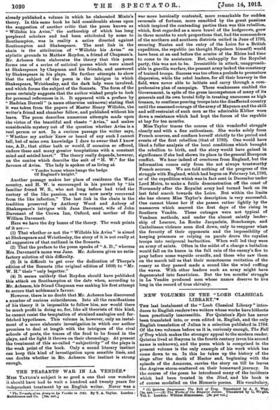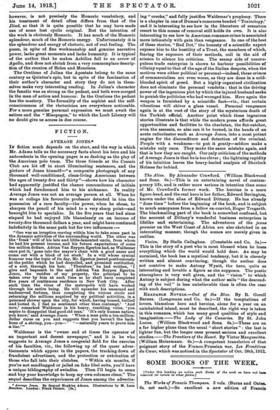NEW VOLUMES IN THE " LOEB CLASSICAL LIBRARY."*
THE last instalment of the " Loeb Classical Library" intro- duces to English readers two writers whose works have hitherto been practically inaccessible. For Quintus's Epic has never been translated into, or even edited in, English, and the only English translation of Julian is a selection published in 1784. Of the two volumes before us it is, curiously enough, The Fall of Troy which makes the stronger appeal to the modern reader. Quintus lived at Smyrna in the fourth century (even his second name is unknown), and the poem which is comprised in the present volume is the only example of his work which has come down to us. In this he takes up the history of the siege after the death of Hector and, beginning with the episode of the Amazons, carries the story on till he leaves the Argives storm-scattered on their homeward journey. In the course of the poem he introduced many of the incidents which had been treated in the Iliad, and his book is of course modelled on the Homeric poems. His vocabulary, • (1) Quintus Smyrnaeus: The Fall of Troy. Translated by A. S. Way. [5s. net.1—(2) The Works of the Emperor Julian. Translated by C. Wr ght, Vol. 1. London: William Heinemann. [5s. per vol. J
however, is not precisely the Homeric vocabulary, and his treatment of detail often differs from that of the Iliad, so that it is quite possible that he may have made use of some lost cyclic original. But the intention of the work is obviously Homeric. It has much of the Homeric splendour, much of the Homeric energy. Unfortunately it is the splendour and energy of rhetoric, not of real feeling. The poem, in spite of fine workmanship and genuine narrative power, lacks great moments and lacks humanity. It is typical of the author that he makes Achilles fall to an arrow of Apollo, and does not shrink from a very commonplace descrip- tion of the reunion of Helen and Menelaus.
The Orations of Julian the Apostate belong to the same century as Quintus's epic, but in spite of the fascination of their author's character and story they do not in them- selves make very interesting reading. In Julian's character the fanatic was as strong as the pedant, and both were merged in the man of action and humour. In the Orations the pedant has the mastery. The formality of the sophist and the self- consciousness of the rhetorician are everywhere noticeable. For a more genuine personal expression we must await the satires and the " Misopogon," to which the Loeb Library will no doubt give us access in due course.















































 Previous page
Previous page